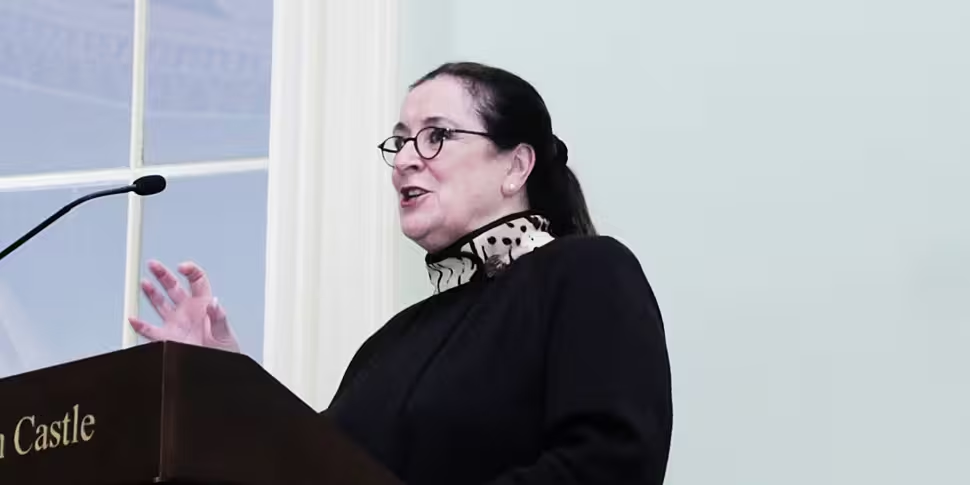One former Senator has questioned 'how awful' murders have to become before judges get more discretion for life sentences in Ireland.
Marie-Louise O'Donnell was speaking after Mr Justice Tony Hunt said it was long past time that judges should have some say in setting minimum terms when it comes to life sentences.
Mr Justice Hunt was speaking as Jozef Puska was last week handed a mandatory life sentence for the murder of Ashling Murphy.
As it stands Puska will be eligible to apply for parole in 12 years.
Ms O'Donnell told The Hard Shoulder there should be a timetable for change.
"The Judge said it, he had absolutely no discretion," she said.
"The first question is: why had he no discretion? When will he get discretion? How long do we have to wait to get discretion?
"How awful and heinous have certain murders to become that he will actually have discretion for minimal custodial sentencing?"
'Beyond redemption'
Ms O'Donnell said she believes some murders are beyond redemption.
"I brought in a bill about this very issue twice into the House, and I might as well have been talking to the wall," she said.
"I came with experience and with knowledge, because I became a patron of Advic - the Advocate for Victims of Homicide.
"These were people who've waiting years and years and years - these are all families and brothers and sisters and mothers and fathers of people who have gone through something like Mr and Mrs Murphy.
"He's right that every murder is not the same, but some murders are beyond redemption and that they need absolute minimal custodial sentencing."
'What is wrong with our Government?'
Ms O'Donnell said the Government has questions to answer.
"You have to ask the question: what is wrong with our Government that that these very heinous, evil, awful, appalling crimes are not dealt with," she said.
"We are waiting years and years and years - and now we have Fine Gael saying at the weekend, 'It's going to be next year'.
"Nobody was listening to these bills in 2014 and 2015, 10 years ago".
Ms O'Donnell said the Irish legal system needs to grow up.
"At some stage Ireland is going to have to grow up and start making that minimal custodial sentences for aggravated, heinous appalling murder is dealt with and dealt with properly."
Parole Board
Ms O'Donnell said the Parole Board, and those on it, need to be more transparent.
Citing the murders of Elizabeth Plunkett and Mary Duffy by John Shaw and Geoffrey Evans in the 1970s, she said: "They were not allowed out on parole.
"They died in prison, but they died in prison because Michael McDowell, as a Minister for Justice, would not let them out.
"That power is now taken from the Minister of Justice, who I elect, and given to the Parole Board who I do not know.
"I'm not suggesting they are in any way questionable but I don't know who they are, I don't know how they think.
"I am against that - I think a heinous, appalling, vicious, evil crime like was perpetuated on Ashing Murphy is not fit for parole after 12 years".
'Huge misrepresentation'
John Lonergan, former governor of Mountjoy Prison, told the show he believes the current system does work.
"I think our present system actually works very well," he said.
"There's huge misrepresentation around the Parole Board system, applying for parole at 12 years and spending your whole life in prison.
"We have quite a number of people who have spent 25, 30, 35 years in prison - they probably will never get out.
"The Judge is a little bit inaccurate when he says that he hasn't [discretion] available to him.
"Every life sentence means that the person has a warrant that will last for his or her entire life.
"The Parole Board system reviews cases... after 12 years of a life sentence, but that does not mean by any stretch of the imagination that the person is likely to get out.
"What the Parole Board simply does in the first stage is to evaluate the circumstances of that particular individual.
"The idea of bringing it in relatively early in a sentence is to give the Parole Board an opportunity to monitor and to work with the individual.
"If there's an element of risk, which there is in a number of cases, well then the Parole Board will simply not release the person.
"Over the last 50 years that I've been involved, life sentences have increased from on average around seven to eight years to 14 years - nowadays it's around 18, 19, 20 years.
"It's continuously going to increase naturally enough."
Mr Lonergan added that the membership of the Parole Board has been publicly available since 2021.
Listen back here:









